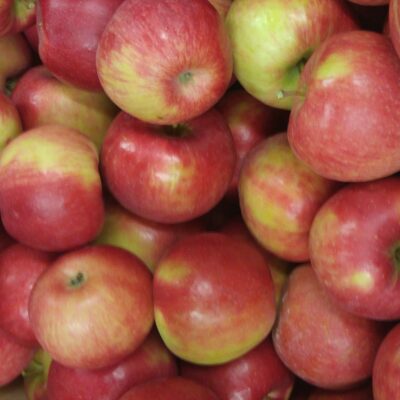Science of the annual apple
People often ask me how we keep our apples so fresh and crispy even though they were picked in the Fall. I tell them apples are like people, they breathe in oxygen and exhale carbon dioxide through pores in their skin. They also give off heat during this process and lose some water through heat of respiration.
In short apples breathe in and out and sweat just like people. Eventually the apple becomes softer with age and dehydrated from the loss of water. The apple will spoil as the cells in the fruit decay and die. While we cannot reverse the ageing process of an apple, we can present it with conditions that slow the process.
To do this we harvest the apples in a slightly immature state (like green bananas) and put them in an air tight, refrigerated room. We flood the floors with water to keep up the humidity and pump nitrogen from a nitrogen generator into the sealed room to displace most of the oxygen.
Normal air contains 20. 8% oxygen; we reduce this down to about 1% to slow down the entire respiration process. We have to monitor the oxygen level to prevent it from getting below the 1% mark or cells will begin to die. The apples continue to breathe and exhale carbon dioxide. We must monitor the breathing so that of carbon dioxide does not cause discolouration of the skin.
We pump the air from the room through an activated charcoal filter to scrub the excess carbon dioxide and then return it to the room. When piling apples in the room we have to be cognizant of airflow so that all bins of apples receive circulated air and there are no dead zones. Fans In the room run continuously to circulate the air to make sure the correct concentration is maintained throughout the room.
Once the room is opened up and ventilated for 24 hours, the apples wake up and start to age normally. Generally the apples should be sold in 4 to 6 weeks from the time the room is opened up. This is why we have many controlled atmosphere storage rooms so we can open up one room and when it’s sold we open up the next one and so on.
We put a few of each kind of apple in each room based on what we think we will need each month. Interestingly, I have eaten an apple that is 2 1/2 years old that was stored in an experimental station and it tasted fine. However, the expense for keeping in apple more than 12 months outweighs the benefits unless you can predict a crop failure for next year, as those apples will have much lower storage costs.
I sometimes joke that if I could apply the same theory to humans I could turn my controlled atmosphere rooms into a hotel and advertise with the tagline “sleep here and wake up tomorrow as young as you were yesterday’…
